人教版(2019)选择性必修第一册Unit 3 Fascinating Parks Words and expressions 重点单词讲解课件(44张)
文档属性
| 名称 | 人教版(2019)选择性必修第一册Unit 3 Fascinating Parks Words and expressions 重点单词讲解课件(44张) | 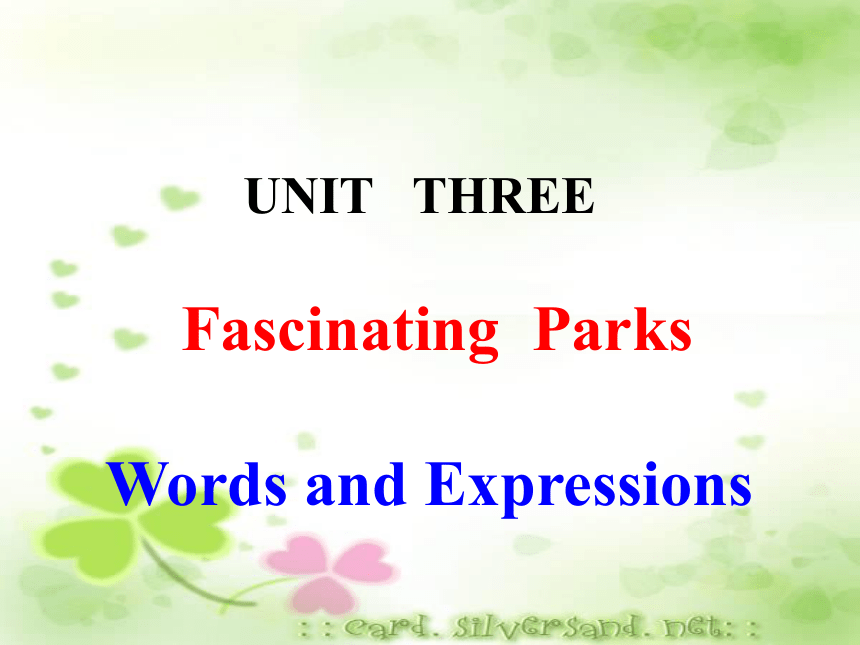 | |
| 格式 | pptx | ||
| 文件大小 | 3.2MB | ||
| 资源类型 | 教案 | ||
| 版本资源 | 人教版(2019) | ||
| 科目 | 英语 | ||
| 更新时间 | 2021-10-31 18:59:04 | ||
图片预览

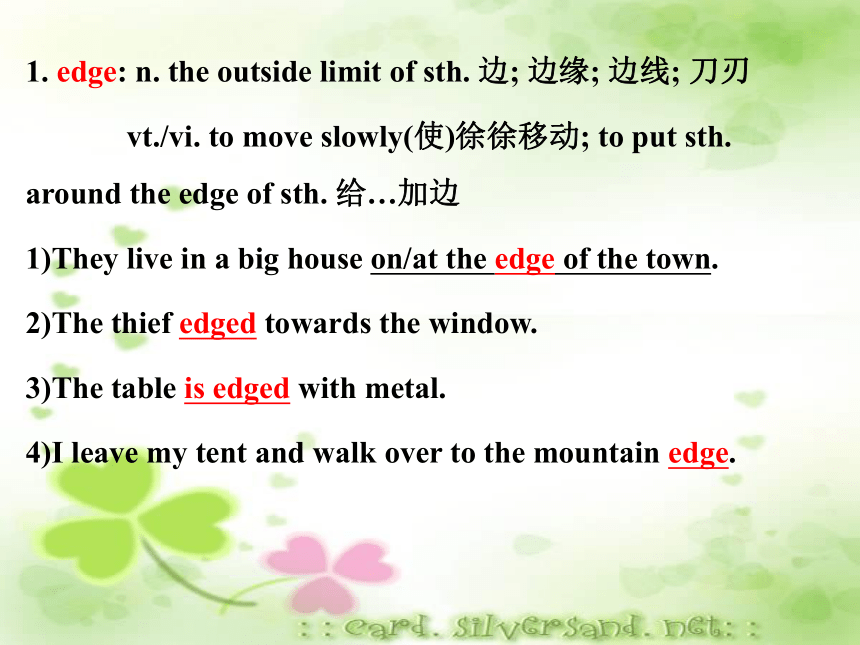
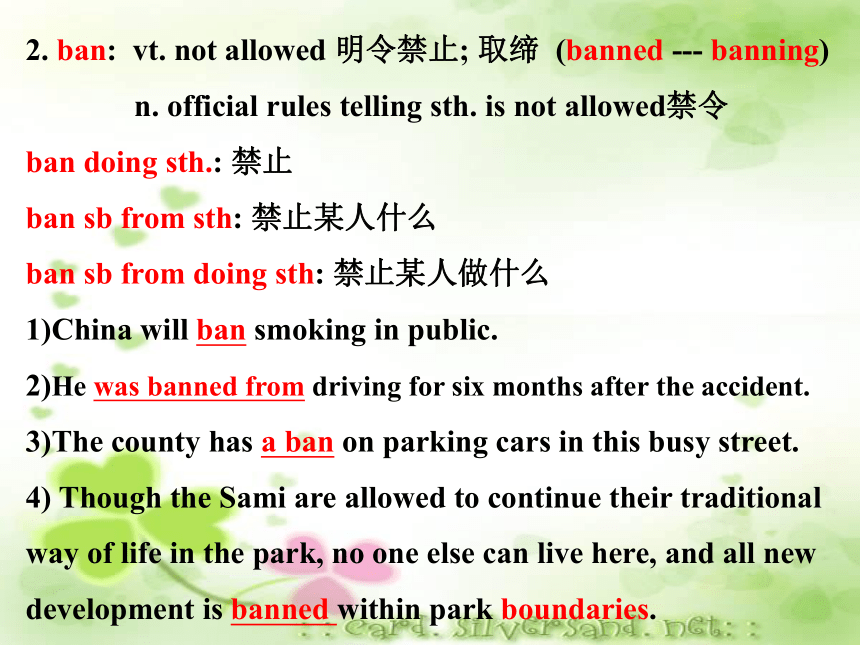
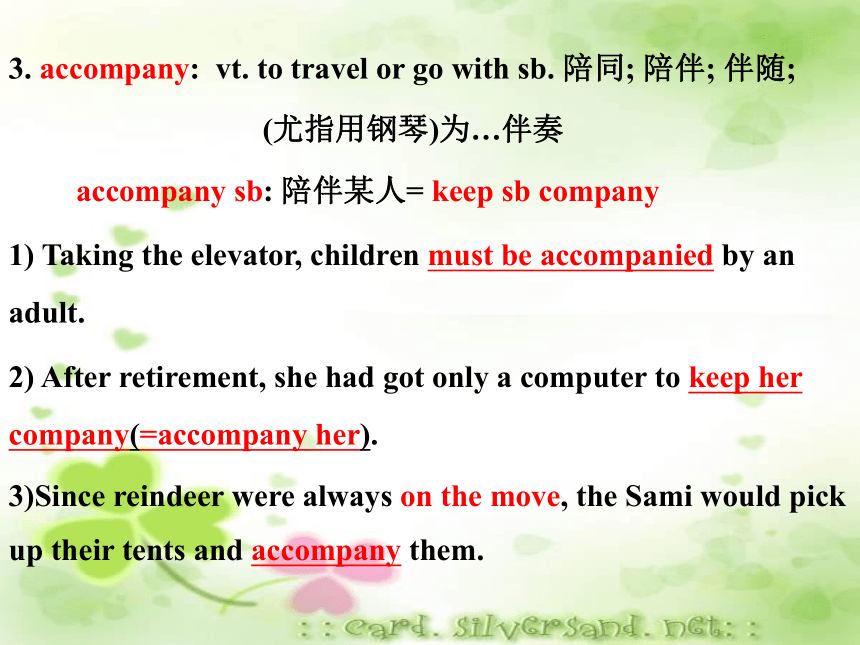


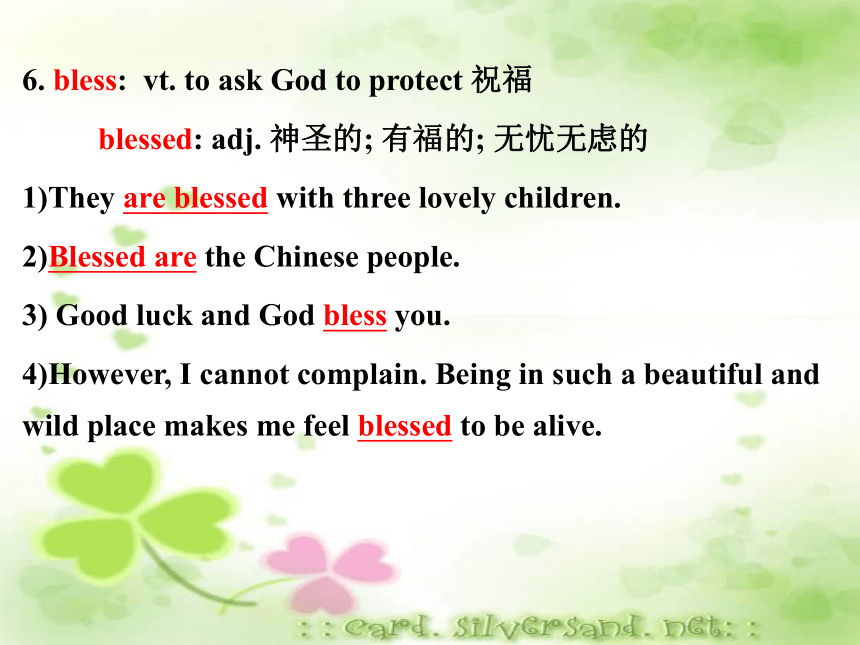
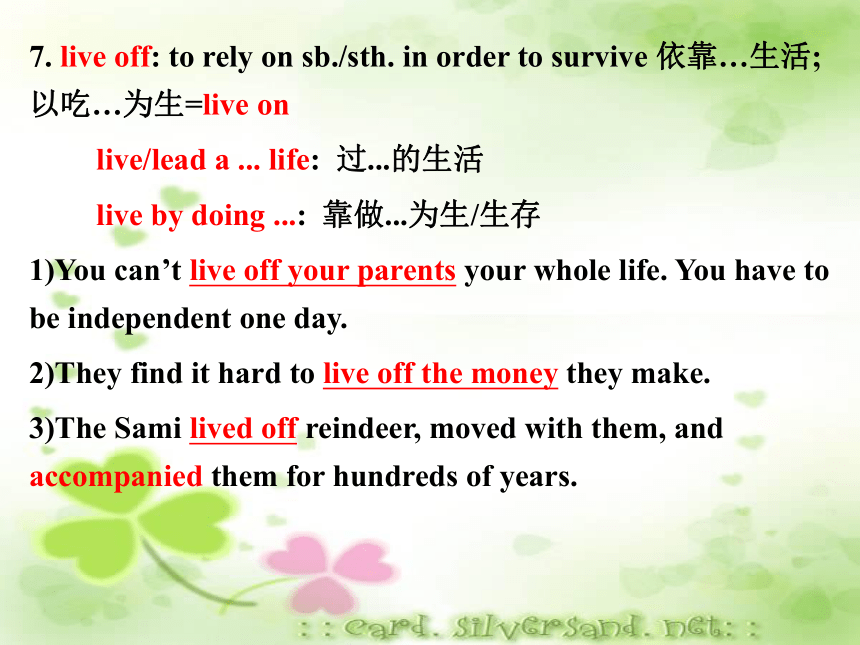
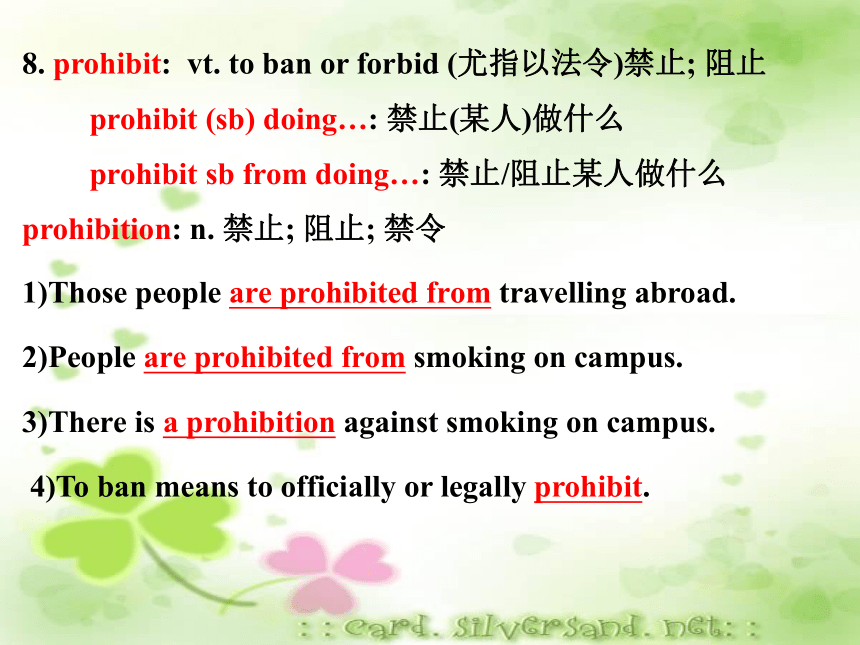
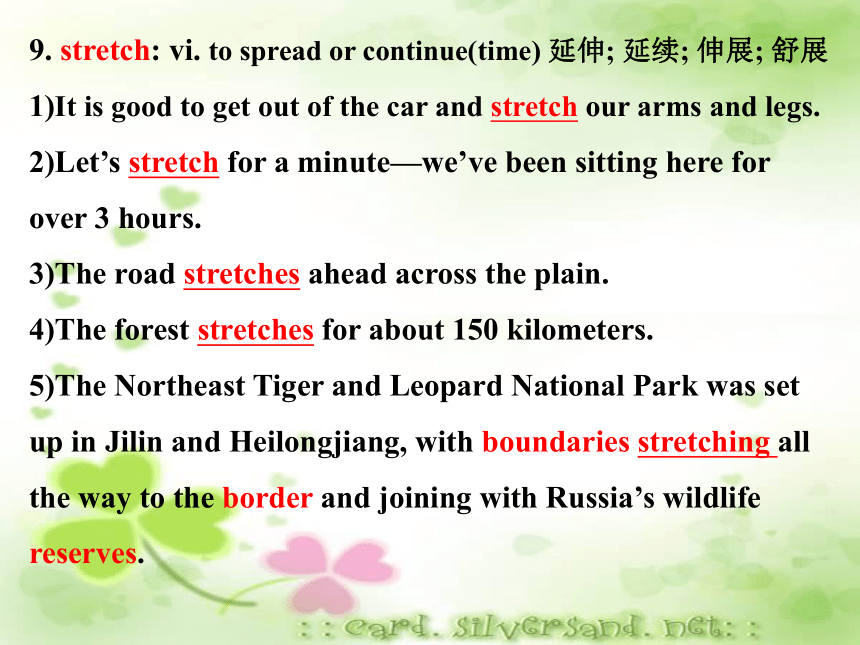

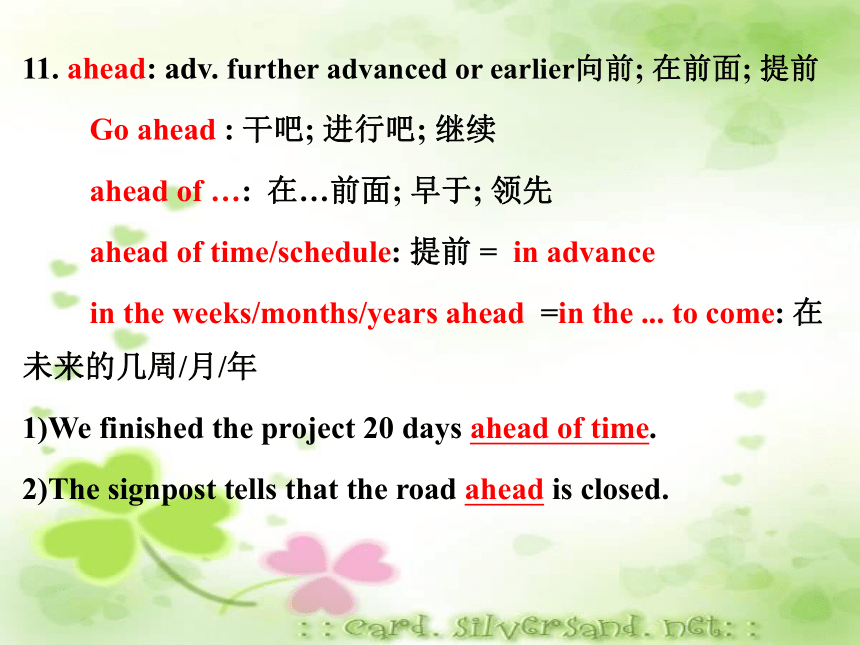
文档简介
(共44张PPT)
UNIT THREE
Fascinating Parks
Words and Expressions
1. edge: n. the outside limit of sth. 边; 边缘; 边线; 刀刃
vt./vi. to move slowly(使)徐徐移动; to put sth. around the edge of sth. 给…加边
1)They live in a big house on/at the edge of the town.
2)The thief edged towards the window.
3)The table is edged with metal.
4)I leave my tent and walk over to the mountain edge.
2. ban: vt. not allowed 明令禁止; 取缔 (banned --- banning)
n. official rules telling sth. is not allowed禁令
ban doing sth.: 禁止
ban sb from sth: 禁止某人什么
ban sb from doing sth: 禁止某人做什么
1)China will ban smoking in public.
2)He was banned from driving for six months after the accident.
3)The county has a ban on parking cars in this busy street.
4) Though the Sami are allowed to continue their traditional way of life in the park, no one else can live here, and all new development is banned within park boundaries.
3. accompany: vt. to travel or go with sb. 陪同; 陪伴; 伴随;
(尤指用钢琴)为…伴奏
accompany sb: 陪伴某人= keep sb company
1) Taking the elevator, children must be accompanied by an adult.
2) After retirement, she had got only a computer to keep her company(=accompany her).
3)Since reindeer were always on the move, the Sami would pick up their tents and accompany them.
4. adopt: vt. to accept 采用; 采取; 采纳; 领养
adoption: n. 采用; 领养
adapt: v. to change in order to be suitable 适应; 适合; 改编; 改写
1)He adopted a different approach to the problem.
2)Danny is their adopted son.
3)I am not a Sami, but in Sarek I’ve adopted some of their habits.
5. set out: 出发; 启程; (怀着目标)开始工作
set out to do …: 开始做什么
set out for…: 出发去…
set off/forth: 出发; 上路; 动身
1)They decided to set out (for the town) right away.
2)We will set out to find the truth behind the failure.
3)After breakfast, I pack my bag and set out again.
6. bless: vt. to ask God to protect 祝福
blessed: adj. 神圣的; 有福的; 无忧无虑的
1)They are blessed with three lovely children.
2)Blessed are the Chinese people.
3) Good luck and God bless you.
4)However, I cannot complain. Being in such a beautiful and wild place makes me feel blessed to be alive.
7. live off: to rely on sb./sth. in order to survive 依靠…生活; 以吃…为生=live on
live/lead a ... life: 过...的生活
live by doing ...: 靠做...为生/生存
1)You can’t live off your parents your whole life. You have to be independent one day.
2)They find it hard to live off the money they make.
3)The Sami lived off reindeer, moved with them, and accompanied them for hundreds of years.
8. prohibit: vt. to ban or forbid (尤指以法令)禁止; 阻止
prohibit (sb) doing…: 禁止(某人)做什么
prohibit sb from doing…: 禁止/阻止某人做什么
prohibition: n. 禁止; 阻止; 禁令
1)Those people are prohibited from travelling abroad.
2)People are prohibited from smoking on campus.
3)There is a prohibition against smoking on campus.
4)To ban means to officially or legally prohibit.
9. stretch: vi. to spread or continue(time) 延伸; 延续; 伸展; 舒展
1)It is good to get out of the car and stretch our arms and legs.
2)Let’s stretch for a minute—we’ve been sitting here for over 3 hours.
3)The road stretches ahead across the plain.
4)The forest stretches for about 150 kilometers.
5)The Northeast Tiger and Leopard National Park was set up in Jilin and Heilongjiang, with boundaries stretching all the way to the border and joining with Russia’s wildlife reserves.
10. rewarding: adj. worth 值得做的; 有益的
reward: n. 奖励; 回报; 报酬; 悬赏金
v. 奖励; 奖赏; 给报酬
1)Volunteering is fun and rewarding, but if you want to be a good volunteer, you need to learn more.
2) It is both challenging and rewarding to study English well.
3) You deserve a reward for being so helpful.
11. ahead: adv. further advanced or earlier向前; 在前面; 提前
Go ahead : 干吧; 进行吧; 继续
ahead of …: 在…前面; 早于; 领先
ahead of time/schedule: 提前 = in advance
in the weeks/months/years ahead =in the ... to come: 在未来的几周/月/年
1)We finished the project 20 days ahead of time.
2)The signpost tells that the road ahead is closed.
12. incredible: adj. unbelievable极好的; 极大的; 难以置信的
It is incredible that ...: 难以置信; 无法相信
1)She has incredible interest in wildlife in the district.
2)It is incredible that he should have gone to live in such a dangerous country.
3)Whichever and whatever you like, there is an incredible theme park that will appeal to you.
13. appeal: vi. to attract有吸引力; make an urgent request呼吁; 恳求; 上诉
n. 吸引力; 呼吁; 上诉; 请求
appeal to...: 有吸引力; 有感染力; 呼呼; 上诉; 打动
appeal to sb to do...: 呼吁某人做什么
1)They will appeal to the local government for money to build a hospital.
2)The school is appealing to everyone to save water and electricity.
3)This kind of film has much/little/no appeal for me.
4)The police made an appeal to the public to remain calm.
14. amusement: n. activity of pleasure 娱乐(活动); feeling of pleasure愉悦
amuse: v. 使开心/愉快/发笑; 逗笑; 逗乐
amused : adj. 愉快的; 开心的; 逗乐的
amusing: adj. 有趣的;引人发笑的; 令人开心的/愉快的
be amused at/by/with...: 因...而乐
an amusement park: 游乐场
to one’s amusement: 使某人高兴的是
1)As you wander around the fantasy amusement park, you may see Snow White or Mickey Mouse in a parade or even on the street.
2)Disneyland also has many exciting rides to amuse you, from enormous swinging ships to scary free-fall drops.
2)The scientists found some rare plants
in the forest.
3)He suffers from a rare blood disease.
4)How do you like your roast beef,
rare or well done
5)It’s rare that I have an evening meal
with my parents.
54. steam [sti m]:
n. 蒸汽; 水蒸气; 蒸汽动力
vi. 蒸发; 散发蒸汽; 冒水汽
1)Riding on the only steam engine still
working in the southeastern
United States is a special treat.
2)She wiped the steam from her glasses.
3)Who invented the steam engine/train
4)You can steam the fish. It will taste
delicious.
5)The cup of coffee was steaming.
55. superb [su p b]: adj. 极佳的; 卓越的
super [ su p ]:
adj. 超级的; 极好的;了不起的
outstanding: adj. 优秀的; 杰出的; 重要的
excellent [ eks l nt]:
adj. 优秀的; 很好的; 好极了
1)And for those who like rides, Dollywood
has a superb old wooden roller coaster,
Thunderhead.
2)You look superb.
3)Michael Jordan is a superb player.
4)My wife and I discovered some
superb places to eat.
5)The car is in superb condition.
56. aquarium [ kwe ri m]: n. 水族馆;
水族玻璃槽; 养鱼缸
(复数: aquariums /aquaria [ 'kwe ri ])
1)Last Friday we went to the Georgia
Aquarium and saw different kinds of
sea life from over the world.
2)What time does the Chongqing Aquarium
open
57. up to...: 多达; 达到(某数量、程度等);
直到; 不多于; (体力或智力上)能胜任
It is up to you. 由你决定。
It is up to sb to do...:
做...由某人决定; 做...是某人的职责/责任
What are you up to 你在做什么
你在忙些什么
1)Here you can walk under the Whale
Shark Aquarium---the world’s
largest---and see up to 20, 000
fish, in addition to a whale shark
68 metres in length.
2)You can write up to five key words
on the card.
3)I will read up to page 60.
4)Up to 200 students admitted that
they played on the phones last night.
5)In my opinion, he is (not) up to the
work/job/task.
6)My English really isn’t up to the work.
I do apologize.
58. polar [ p l (r)]: adj. (近)极地的;
南极(或北极)的; 磁极的
pole [p l]: n. 竿; 柱; 极
The North/South Pole: 北/南极
1)You can also see all kinds of interesting
animals, including polar bears.
2)One day, the penguin and the polar
bear will play together.
59. upside down: 颠倒; 倒转; 翻转
[ psa d]
turn…upside down: 把…倒过来
1)The park has more rides than you
can imagine: join a water fight
against pirates, get turned upside
down by an exciting roller coaster,
or get wet in one of the water rides!
2)The boat floated upside down on the lake.
3)The children hung the map upside down.
4)As he got closer, he found another
car upside down on the road.
5)She opened her eyes and found
everything was upside down.
60. splendid [ splend d]: adj. 壮丽的;
雄伟的; 极佳的; 非常好的
1)I can’t imagine you have such a
splendid house!
2)They think a party is a splendid idea!
3)We won another splendid victory last year.
4)There were great civilizations, splendid
empires, but no freedom anywhere.
61. display [d sple ]: vt. 显示; 陈列
n. 展览; 陈列; 展览品
on display/show: 陈列; 展出
1)Then at night, see the splendid
Journey of Lights Parade and
fireworks display .
2)A new kind of car is on display in
the shop.
3)The details of today’s flights are
displayed on the monitor.
4) She displayed great interest when
visiting the museum.
5)It’s the first time the painting has
been displayed to the public.
62. appetite [ p ta t]:
n. 食欲; 胃口; 强烈欲望
have a good/poor appetite: 胃口好/差
have no appetite: 没有胃口/食欲
lose one’s appetite: 没有胃口/食欲
have an appetite for ...: 有强烈欲望
1)The park has plenty of restaurants with
tasty food for every appetite---you can
even eat while watching the fish swim by.
2)The walk gave me a good appetite.
3)I have no appetite because I didn’t
sleep well last night.
4)To start with, you must have an
appetite for knowledge.
63. entertainment [ ent te nm nt]:
n. 娱乐; 招待; 娱乐活动; 文娱节目
(指娱乐节目或活动,如电影、电视、文艺表演等)
amusement: n. 娱乐; 消遣
(指因事物搞笑而感到的开心,
或为打发时间而进行的娱乐活动)
1)If it is ocean entertainment that you
are looking for, come to Chimelong
Ocean Kingdom!
2)There will be live entertainment at
the party.
3)A cinema is a place of entertainment.
4)I’d like to take the opportunity to
thank you for the best entertainment.
64. column [ k l m]: n.
(书、报纸印刷页上的)栏; 专栏; 柱(形物)
1)I always read her column in the local
newspaper.
2)The temple is supported by twenty
columns.
65. Sami [ sɑ mi]: 萨米人
(居住在斯堪的纳维亚北部的拉普人)
1)Getting here is quite difficult, so
apart from the Sami very few
people have ever seen Sarek.
2)For hundreds of years, looking after
reindeer was a way of life for
the Sami.
拉普人: 北欧斯堪的纳维亚原住民, 自称 “萨米人”, 属于蒙古人种和欧罗巴人种的混合类型, 被称为欧洲 “最后的土著”。主要分布在挪威、瑞典、芬兰和俄罗斯的北极地区, 使用拉普语, 多信基督教路德宗, 少数信东正教,并广泛保留原始宗教残余。拉普人的祖先早自1万年前便开始从乌拉尔地区陆续迁入斯堪的纳维亚, 原分布地区较广, 后受
日耳曼部落和芬兰部落排挤, 逐渐北移, 部分人被后来者
同化。萨米人有着自己悠久的历史和独特的文化, 千百年来, 他们一直生活在山地、雨林、沙漠、极地等偏远地区, 过着自由自在的生活, 与大自然和谐共处、相得益彰。
66. Sarek National Park: 萨勒克国家公园
萨勒克国家公园位于瑞典北部, 是一个颇受徒步旅行者和登山者欢迎的国家公园, 是欧洲最古老的国家公园。它拥有100座冰川和6座超过2000米的山峰, 高山深涧, 风景奇绝。公园整体轮廓呈圆形, 平均直径为50公里, 是一片约2000平方公里未经开发的原生态区域。在萨勒克国家公园徒步和登山不是简单的周末户外活动, 这里没有带标记的道路、小木屋或便利的设施, 只有两座桥, 因此你必须掌握这种地形的知识, 携带旅途所需的设备, 在这里至少要游览一周。
67. Sweden [ swi:d n]: n. 瑞典(国家名)
I’m in the remote far north of Sweden
in Sarek National Park, a place
with no roads or towns.
68. the Arctic Circle: 北极圈
[ ɑ kt k s kl]
1)I’m above the Arctic Circle, where in
summer the sun never sets.
2)It is very cold in the Arctic Circle
all the year.
The Arctic Circle
北极圈: 北极圈的范围包括了格陵兰岛、北欧和俄罗斯北部, 以及加拿大北部。北极圈内岛屿很多, 最大的是格陵兰岛。由于严寒, 北冰洋区域内的生物种类相对较少, 植物以地衣、苔藓为主, 树木稀少, 动物著名的有北极熊、海豹、鲸等。北极圈也是极昼和极夜现象开始出现的界线, 北极圈以北的地区在夏天会出现极昼, 而在冬天会出现极夜。
69. the Rapa River: 拉帕河 [ rɑ pɑ ]
拉帕河是小吕勒河的支流, 全长仅75公里, 流经萨勒克国家公园, 蜿蜒穿过雄伟的山脉和狭窄的山谷。拉帕河流量巨大并且输送着大量的沉积物, 所以在萨勒克国家公园形成了壮阔的拉帕河三角洲景观, 其被群山、冰川和深谷环绕,呈现出一幅非凡的景象。拉帕河谷到处都是层峦叠嶂的山峰, 常年被雨水包围, 所以这里也是未受外界污染的荒野之地。此地栖息着大量的野生动物, 较为常见的有麋鹿、熊和山猫等, 许多濒危物种在这里也能找到它们的踪迹。
70. Siberian [sa b r n]:
adj. 西伯利亚(人)的
n. 西伯利亚人
1)The zoos have most of the world’s
Siberian tigers.
2)The man was a real hunter, a Siberian!
71. Dollywood [ d liwud]: 多莉山主题公园
多莉山主题公园坐落在美国田纳西州的皮格佛格, 是美国乡村乐坛有史以来最富创造力的著名歌手多莉·帕顿(Dolly Parton)于1986年在自己的家乡田纳西收购了一家衰败的古老公园, 并在此基础上创建了这个主题公园。多莉山主题公园充满了各种惊险刺激的娱乐设施, 比方说 “多莉德比毁灭碰碰车” 和 “多莉山蒸汽特快” 等等。
多莉·帕顿1946年2月19日出生于美国田纳西州, 是乡村乐坛有史以来最富创造力的女歌手:超过五十张的畅销专辑, 二十二首乡村排行冠军歌曲, 十张金唱片与白金唱片销售纪录, 多次格莱美奖得主, 2011年她获得格莱美终身成就奖。
UNIT THREE
Fascinating Parks
Words and Expressions
1. edge: n. the outside limit of sth. 边; 边缘; 边线; 刀刃
vt./vi. to move slowly(使)徐徐移动; to put sth. around the edge of sth. 给…加边
1)They live in a big house on/at the edge of the town.
2)The thief edged towards the window.
3)The table is edged with metal.
4)I leave my tent and walk over to the mountain edge.
2. ban: vt. not allowed 明令禁止; 取缔 (banned --- banning)
n. official rules telling sth. is not allowed禁令
ban doing sth.: 禁止
ban sb from sth: 禁止某人什么
ban sb from doing sth: 禁止某人做什么
1)China will ban smoking in public.
2)He was banned from driving for six months after the accident.
3)The county has a ban on parking cars in this busy street.
4) Though the Sami are allowed to continue their traditional way of life in the park, no one else can live here, and all new development is banned within park boundaries.
3. accompany: vt. to travel or go with sb. 陪同; 陪伴; 伴随;
(尤指用钢琴)为…伴奏
accompany sb: 陪伴某人= keep sb company
1) Taking the elevator, children must be accompanied by an adult.
2) After retirement, she had got only a computer to keep her company(=accompany her).
3)Since reindeer were always on the move, the Sami would pick up their tents and accompany them.
4. adopt: vt. to accept 采用; 采取; 采纳; 领养
adoption: n. 采用; 领养
adapt: v. to change in order to be suitable 适应; 适合; 改编; 改写
1)He adopted a different approach to the problem.
2)Danny is their adopted son.
3)I am not a Sami, but in Sarek I’ve adopted some of their habits.
5. set out: 出发; 启程; (怀着目标)开始工作
set out to do …: 开始做什么
set out for…: 出发去…
set off/forth: 出发; 上路; 动身
1)They decided to set out (for the town) right away.
2)We will set out to find the truth behind the failure.
3)After breakfast, I pack my bag and set out again.
6. bless: vt. to ask God to protect 祝福
blessed: adj. 神圣的; 有福的; 无忧无虑的
1)They are blessed with three lovely children.
2)Blessed are the Chinese people.
3) Good luck and God bless you.
4)However, I cannot complain. Being in such a beautiful and wild place makes me feel blessed to be alive.
7. live off: to rely on sb./sth. in order to survive 依靠…生活; 以吃…为生=live on
live/lead a ... life: 过...的生活
live by doing ...: 靠做...为生/生存
1)You can’t live off your parents your whole life. You have to be independent one day.
2)They find it hard to live off the money they make.
3)The Sami lived off reindeer, moved with them, and accompanied them for hundreds of years.
8. prohibit: vt. to ban or forbid (尤指以法令)禁止; 阻止
prohibit (sb) doing…: 禁止(某人)做什么
prohibit sb from doing…: 禁止/阻止某人做什么
prohibition: n. 禁止; 阻止; 禁令
1)Those people are prohibited from travelling abroad.
2)People are prohibited from smoking on campus.
3)There is a prohibition against smoking on campus.
4)To ban means to officially or legally prohibit.
9. stretch: vi. to spread or continue(time) 延伸; 延续; 伸展; 舒展
1)It is good to get out of the car and stretch our arms and legs.
2)Let’s stretch for a minute—we’ve been sitting here for over 3 hours.
3)The road stretches ahead across the plain.
4)The forest stretches for about 150 kilometers.
5)The Northeast Tiger and Leopard National Park was set up in Jilin and Heilongjiang, with boundaries stretching all the way to the border and joining with Russia’s wildlife reserves.
10. rewarding: adj. worth 值得做的; 有益的
reward: n. 奖励; 回报; 报酬; 悬赏金
v. 奖励; 奖赏; 给报酬
1)Volunteering is fun and rewarding, but if you want to be a good volunteer, you need to learn more.
2) It is both challenging and rewarding to study English well.
3) You deserve a reward for being so helpful.
11. ahead: adv. further advanced or earlier向前; 在前面; 提前
Go ahead : 干吧; 进行吧; 继续
ahead of …: 在…前面; 早于; 领先
ahead of time/schedule: 提前 = in advance
in the weeks/months/years ahead =in the ... to come: 在未来的几周/月/年
1)We finished the project 20 days ahead of time.
2)The signpost tells that the road ahead is closed.
12. incredible: adj. unbelievable极好的; 极大的; 难以置信的
It is incredible that ...: 难以置信; 无法相信
1)She has incredible interest in wildlife in the district.
2)It is incredible that he should have gone to live in such a dangerous country.
3)Whichever and whatever you like, there is an incredible theme park that will appeal to you.
13. appeal: vi. to attract有吸引力; make an urgent request呼吁; 恳求; 上诉
n. 吸引力; 呼吁; 上诉; 请求
appeal to...: 有吸引力; 有感染力; 呼呼; 上诉; 打动
appeal to sb to do...: 呼吁某人做什么
1)They will appeal to the local government for money to build a hospital.
2)The school is appealing to everyone to save water and electricity.
3)This kind of film has much/little/no appeal for me.
4)The police made an appeal to the public to remain calm.
14. amusement: n. activity of pleasure 娱乐(活动); feeling of pleasure愉悦
amuse: v. 使开心/愉快/发笑; 逗笑; 逗乐
amused : adj. 愉快的; 开心的; 逗乐的
amusing: adj. 有趣的;引人发笑的; 令人开心的/愉快的
be amused at/by/with...: 因...而乐
an amusement park: 游乐场
to one’s amusement: 使某人高兴的是
1)As you wander around the fantasy amusement park, you may see Snow White or Mickey Mouse in a parade or even on the street.
2)Disneyland also has many exciting rides to amuse you, from enormous swinging ships to scary free-fall drops.
2)The scientists found some rare plants
in the forest.
3)He suffers from a rare blood disease.
4)How do you like your roast beef,
rare or well done
5)It’s rare that I have an evening meal
with my parents.
54. steam [sti m]:
n. 蒸汽; 水蒸气; 蒸汽动力
vi. 蒸发; 散发蒸汽; 冒水汽
1)Riding on the only steam engine still
working in the southeastern
United States is a special treat.
2)She wiped the steam from her glasses.
3)Who invented the steam engine/train
4)You can steam the fish. It will taste
delicious.
5)The cup of coffee was steaming.
55. superb [su p b]: adj. 极佳的; 卓越的
super [ su p ]:
adj. 超级的; 极好的;了不起的
outstanding: adj. 优秀的; 杰出的; 重要的
excellent [ eks l nt]:
adj. 优秀的; 很好的; 好极了
1)And for those who like rides, Dollywood
has a superb old wooden roller coaster,
Thunderhead.
2)You look superb.
3)Michael Jordan is a superb player.
4)My wife and I discovered some
superb places to eat.
5)The car is in superb condition.
56. aquarium [ kwe ri m]: n. 水族馆;
水族玻璃槽; 养鱼缸
(复数: aquariums /aquaria [ 'kwe ri ])
1)Last Friday we went to the Georgia
Aquarium and saw different kinds of
sea life from over the world.
2)What time does the Chongqing Aquarium
open
57. up to...: 多达; 达到(某数量、程度等);
直到; 不多于; (体力或智力上)能胜任
It is up to you. 由你决定。
It is up to sb to do...:
做...由某人决定; 做...是某人的职责/责任
What are you up to 你在做什么
你在忙些什么
1)Here you can walk under the Whale
Shark Aquarium---the world’s
largest---and see up to 20, 000
fish, in addition to a whale shark
68 metres in length.
2)You can write up to five key words
on the card.
3)I will read up to page 60.
4)Up to 200 students admitted that
they played on the phones last night.
5)In my opinion, he is (not) up to the
work/job/task.
6)My English really isn’t up to the work.
I do apologize.
58. polar [ p l (r)]: adj. (近)极地的;
南极(或北极)的; 磁极的
pole [p l]: n. 竿; 柱; 极
The North/South Pole: 北/南极
1)You can also see all kinds of interesting
animals, including polar bears.
2)One day, the penguin and the polar
bear will play together.
59. upside down: 颠倒; 倒转; 翻转
[ psa d]
turn…upside down: 把…倒过来
1)The park has more rides than you
can imagine: join a water fight
against pirates, get turned upside
down by an exciting roller coaster,
or get wet in one of the water rides!
2)The boat floated upside down on the lake.
3)The children hung the map upside down.
4)As he got closer, he found another
car upside down on the road.
5)She opened her eyes and found
everything was upside down.
60. splendid [ splend d]: adj. 壮丽的;
雄伟的; 极佳的; 非常好的
1)I can’t imagine you have such a
splendid house!
2)They think a party is a splendid idea!
3)We won another splendid victory last year.
4)There were great civilizations, splendid
empires, but no freedom anywhere.
61. display [d sple ]: vt. 显示; 陈列
n. 展览; 陈列; 展览品
on display/show: 陈列; 展出
1)Then at night, see the splendid
Journey of Lights Parade and
fireworks display .
2)A new kind of car is on display in
the shop.
3)The details of today’s flights are
displayed on the monitor.
4) She displayed great interest when
visiting the museum.
5)It’s the first time the painting has
been displayed to the public.
62. appetite [ p ta t]:
n. 食欲; 胃口; 强烈欲望
have a good/poor appetite: 胃口好/差
have no appetite: 没有胃口/食欲
lose one’s appetite: 没有胃口/食欲
have an appetite for ...: 有强烈欲望
1)The park has plenty of restaurants with
tasty food for every appetite---you can
even eat while watching the fish swim by.
2)The walk gave me a good appetite.
3)I have no appetite because I didn’t
sleep well last night.
4)To start with, you must have an
appetite for knowledge.
63. entertainment [ ent te nm nt]:
n. 娱乐; 招待; 娱乐活动; 文娱节目
(指娱乐节目或活动,如电影、电视、文艺表演等)
amusement: n. 娱乐; 消遣
(指因事物搞笑而感到的开心,
或为打发时间而进行的娱乐活动)
1)If it is ocean entertainment that you
are looking for, come to Chimelong
Ocean Kingdom!
2)There will be live entertainment at
the party.
3)A cinema is a place of entertainment.
4)I’d like to take the opportunity to
thank you for the best entertainment.
64. column [ k l m]: n.
(书、报纸印刷页上的)栏; 专栏; 柱(形物)
1)I always read her column in the local
newspaper.
2)The temple is supported by twenty
columns.
65. Sami [ sɑ mi]: 萨米人
(居住在斯堪的纳维亚北部的拉普人)
1)Getting here is quite difficult, so
apart from the Sami very few
people have ever seen Sarek.
2)For hundreds of years, looking after
reindeer was a way of life for
the Sami.
拉普人: 北欧斯堪的纳维亚原住民, 自称 “萨米人”, 属于蒙古人种和欧罗巴人种的混合类型, 被称为欧洲 “最后的土著”。主要分布在挪威、瑞典、芬兰和俄罗斯的北极地区, 使用拉普语, 多信基督教路德宗, 少数信东正教,并广泛保留原始宗教残余。拉普人的祖先早自1万年前便开始从乌拉尔地区陆续迁入斯堪的纳维亚, 原分布地区较广, 后受
日耳曼部落和芬兰部落排挤, 逐渐北移, 部分人被后来者
同化。萨米人有着自己悠久的历史和独特的文化, 千百年来, 他们一直生活在山地、雨林、沙漠、极地等偏远地区, 过着自由自在的生活, 与大自然和谐共处、相得益彰。
66. Sarek National Park: 萨勒克国家公园
萨勒克国家公园位于瑞典北部, 是一个颇受徒步旅行者和登山者欢迎的国家公园, 是欧洲最古老的国家公园。它拥有100座冰川和6座超过2000米的山峰, 高山深涧, 风景奇绝。公园整体轮廓呈圆形, 平均直径为50公里, 是一片约2000平方公里未经开发的原生态区域。在萨勒克国家公园徒步和登山不是简单的周末户外活动, 这里没有带标记的道路、小木屋或便利的设施, 只有两座桥, 因此你必须掌握这种地形的知识, 携带旅途所需的设备, 在这里至少要游览一周。
67. Sweden [ swi:d n]: n. 瑞典(国家名)
I’m in the remote far north of Sweden
in Sarek National Park, a place
with no roads or towns.
68. the Arctic Circle: 北极圈
[ ɑ kt k s kl]
1)I’m above the Arctic Circle, where in
summer the sun never sets.
2)It is very cold in the Arctic Circle
all the year.
The Arctic Circle
北极圈: 北极圈的范围包括了格陵兰岛、北欧和俄罗斯北部, 以及加拿大北部。北极圈内岛屿很多, 最大的是格陵兰岛。由于严寒, 北冰洋区域内的生物种类相对较少, 植物以地衣、苔藓为主, 树木稀少, 动物著名的有北极熊、海豹、鲸等。北极圈也是极昼和极夜现象开始出现的界线, 北极圈以北的地区在夏天会出现极昼, 而在冬天会出现极夜。
69. the Rapa River: 拉帕河 [ rɑ pɑ ]
拉帕河是小吕勒河的支流, 全长仅75公里, 流经萨勒克国家公园, 蜿蜒穿过雄伟的山脉和狭窄的山谷。拉帕河流量巨大并且输送着大量的沉积物, 所以在萨勒克国家公园形成了壮阔的拉帕河三角洲景观, 其被群山、冰川和深谷环绕,呈现出一幅非凡的景象。拉帕河谷到处都是层峦叠嶂的山峰, 常年被雨水包围, 所以这里也是未受外界污染的荒野之地。此地栖息着大量的野生动物, 较为常见的有麋鹿、熊和山猫等, 许多濒危物种在这里也能找到它们的踪迹。
70. Siberian [sa b r n]:
adj. 西伯利亚(人)的
n. 西伯利亚人
1)The zoos have most of the world’s
Siberian tigers.
2)The man was a real hunter, a Siberian!
71. Dollywood [ d liwud]: 多莉山主题公园
多莉山主题公园坐落在美国田纳西州的皮格佛格, 是美国乡村乐坛有史以来最富创造力的著名歌手多莉·帕顿(Dolly Parton)于1986年在自己的家乡田纳西收购了一家衰败的古老公园, 并在此基础上创建了这个主题公园。多莉山主题公园充满了各种惊险刺激的娱乐设施, 比方说 “多莉德比毁灭碰碰车” 和 “多莉山蒸汽特快” 等等。
多莉·帕顿1946年2月19日出生于美国田纳西州, 是乡村乐坛有史以来最富创造力的女歌手:超过五十张的畅销专辑, 二十二首乡村排行冠军歌曲, 十张金唱片与白金唱片销售纪录, 多次格莱美奖得主, 2011年她获得格莱美终身成就奖。
